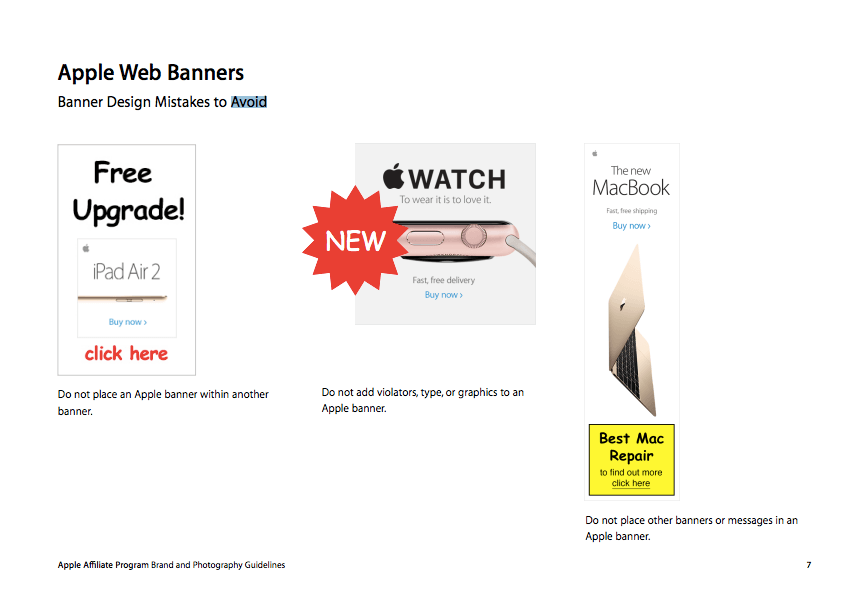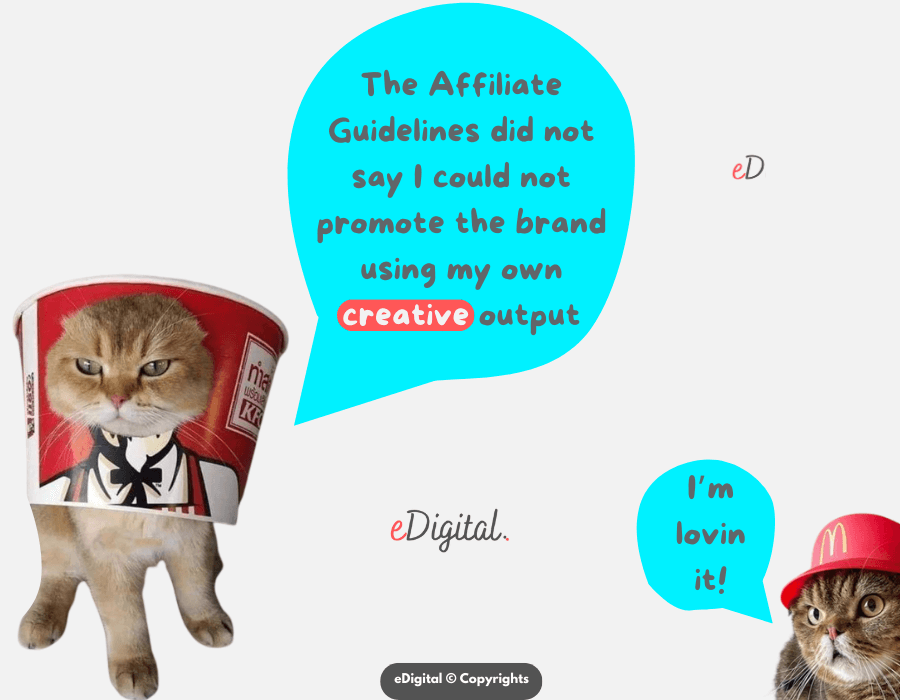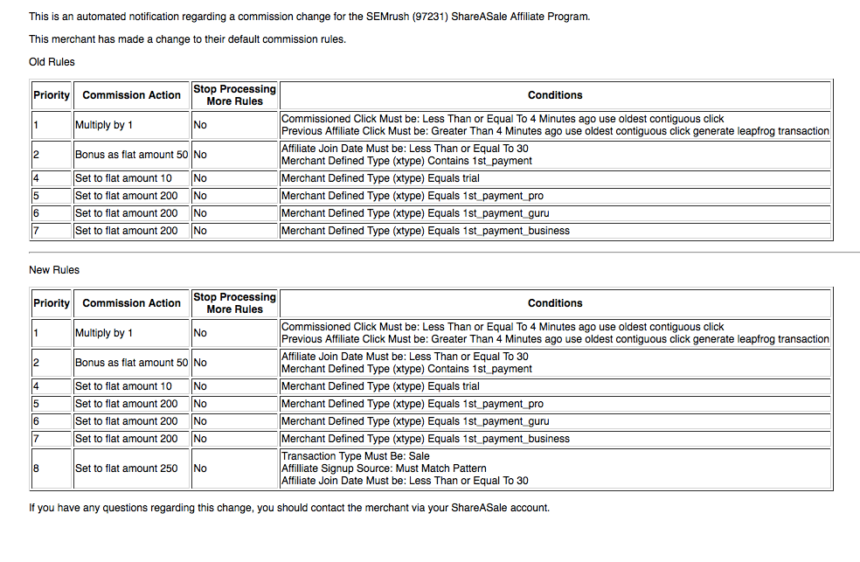THE BEST AFFILIATE GUIDELINES TEMPLATE IN 2025
How to write the best Affiliate Guidelines document in 2025. The top Affiliate Guidelines template. Affiliate tips, rules, T&C’s. Craft your affiliate rules, tips, best practices, terms & conditions.
Written by Mau, a Senior Affiliate Marketing Specialist at eDigital.
What is an Affiliate Guidelines document?
An Affiliate Guidelines document is written by Affiliate Managers or Marketing Managers and provides a standard of acceptable professional online behaviour for affiliates when promoting a company’s products and services.
A professionally written Affiliate Guidelines document also offers affiliates insights on how to communicate products’ functionality and benefits to their audience and how to disclose their “Affiliate relationship” with a company.
A well-written affiliate guidelines document is the “true” source when an affiliate is not sure what, when or how they can talk about a company’s products/services or company’s employees.
An affiliate guidelines document should be easy to access by any of your affiliates and be accessed through:
- Your official company’s website
- Privately via an affiliate network
Things to consider
- No “one size fits all”. Drafting an “affiliate guidelines” document can be different from business to business. This largely depends on the company‘s culture and strategy toward affiliate programs. However, all companies using affiliates want to protect against the risk of damage to their brand’s reputation. An affiliate guidelines document needs to be individually tailored.
- Involve your marketing, sales and product teams. Do proper consultation with your department managers as different departments might have different levels of risk on what and how affiliates should talk about your brand usage, functionality, benefits, maintenance and/or disposal.
- Affiliate tone and voice. Before you sign a new affiliate, research how the potential affiliate talks about the companies they promote. Do they use a language that will be beneficial for your brand? Does it align nicely with your brand’s values? Is there content created in-house or do they rely on external writers?
- Provide good and bad examples. you can provide examples of what’s acceptable and not. You may have some affiliates using social media to attract leads while others might be focused on in-depth product reviews. You can also use examples of poor commentary. This way, it is clear for affiliates to know what they should avoid.
Below is an example of the Apple Affiliate Guidelines showing banner design mistakes to avoid.

Apple affiliate guidelines banner design mistakes to avoid
- Track negative commentary or bad sentiment when mentioning your company name or brand name. You can do this using the “Google Alerts” service or use social media listening tools to track mentions about your brand on social media.
- Predict problems that could arise in the future, especially for an upcoming new product, service or advertising campaign that might create some level of controversy, risk or misunderstanding.
- Consultation is key. Understand the affiliate’s key objectives when talking about your company. This will help you gain trust and get buy-in when training your affiliates about the benefits you offer to end customers. In some cases, affiliates often know more about what customers actually want than your marketing team regulating the affiliates.
- Your affiliate terms and conditions and disclosure guidelines. Include that your affiliate guidelines document will be updated from time to time. Also set out potential consequences resulting from an Affiliate’s failure to adhere to your Guidelines – for example, that serious or repeated breaches of your Affiliates Terms and Conditions and Affiliates Guidelines may result in termination of the affiliate relationship.
The top benefits for a well-written affiliates guidelines document
By adopting and implementing a well-drafted and communicated Affiliates Guidelines document, your company can enjoy the advantages of Affiliate marketing while mitigating the associated risks. Below are some key actions when drafting your Affiliate’s Guidelines:
- Create an acceptable level of social media engagement– Encouraging social media promotion about your products/services from Affiliates is acceptable with the right rules in place. Make sure you have appropriate Affiliates Guidelines in place to ensure that all affiliates are made fully aware of the acceptable social media promotion.
- Avoid negative social media commentary from affiliates – Failing to have the appropriate guidelines inserted into your Affiliates Guidelines document can result in affiliates inadvertently or purposefully publishing bad commentary about your products or services. It is in the affiliates’ best interest to promote the benefits of your services to increase their likelihood of earning an Affiliate commission. However, in some cases, you are not the only brand they promote in your category and they might find the not-so-good factors of your products and services to give them more chances of sending users to other Affiliate products that might offer them better commission payments. This can hugely damage your brand’s reputation. A well-structured Affiliate’s Guidelines should avoid this kind of behaviour.
- Guide your affiliates. Do not assume that affiliates fully understand your offering. You should offer practical and real best examples of how best to promote your business products and services. This will clear up any doubts affiliates might have. Some of the world’s best affiliate programs also create “Best affiliates” content so potential affiliates can easily get the benefits of becoming an affiliate.

Shopify affiliate program Adrian Morrison profile
- Minimise negative publicity from a comment made by an affiliate who might not be happy with your product or commission levels.
- List the topics to be avoided when commenting about your products and services.
- Clarify who is the official public spokesperson and/or brand ambassador. The key people offering interviews, mentions and comments to major media outlets.
- Ensure affiliates understand their role when they are promoting your business products and services on their website, social media or other channels.
⭐️⭐️⭐️⭐️⭐️ Useful template
I did not know how to draft our Affiliate Guidelines and this template was really useful! It saved me tons of time. Thank you.
Mark T. ✅ Verified user
Get this Premium Affiliate Guidelines template, so you do not need to start from scratch.
Save time and get a copy of this premium and exclusive template today!
THE BEST AFFILIATE GUIDELINES TEMPLATE IN 2025
How to access this premium template
Steps:
- Please complete payment on PayPal
- Once payment is completed, PayPal will ask you if you want to return to the merchant site. Please accept so you get taken to the our confirmation page where you will have access to your template.
- Any issues, you can always contact us
Special bonus gift:
- Affiliate Letter for FTC Compliance – Template: this is a popular document to be sent to your affiliates ensuring they are complying with the latest FTC requirements when promoting sponsored links.
Yes, that’s right, you will get two templates for the price of one!
The top reasons for writing an affiliate guidelines document
We work with 100+ brands as their affiliate partner and the reality is that most of them do not offer a consistent and clear Affiliate Guidelines document. This means a lot of emails and conversations to try to figure out how we should be promoting their brands and/or how to properly disclose our affiliation to them.
Some of the top reasons for writing a successful affiliate guidelines document are:
- Affiliate commentary in most cases is positive but can also be dangerous and can backfire on your positive brand reputation and trust levels. Affiliates’ comments, notes and photos posted on social media sites and online forums are usually constructive and positive. But negative comments, criticism and confrontational remarks can be dangerous and harmful to the well-being of your employees and your positive brand reputation.
- Once an Affiliate comment is posted on the internet and it is being picked up by the media; it will be almost impossible to delete it. It is important that your Affiliates are trained on the best promotional tactics and practices to help them earn a commission.
- Decreases the chances of a negative comment becoming unfavourable negative publicity for your company.
- Ensures all affiliates are aware of the risks of making a public comment about your company.
- Minimise the use of penalties and warnings to affiliates because of their not acceptable commentary.
- With the popularity of “Best of List” articles, “product reviews” content and “unboxing” articles; it is important to offer clear guidelines to Affiliates on how to best create these types of articles.

Affiliate marketing guidelines funny creative meme KFC McDonalds cats
The top tips when communicating your new affiliates guidelines
- Confirmation. If possible, each affiliate should be asked to read and sign an acknowledgement that they have read your “Affiliate Program Terms and Conditions” document and your “Affiliates Guidelines” document.
- Updates. Ensure you regularly update your Affiliate Guidelines to deal with new risky behaviour and/or new technologies. Make your updates simple to understand and avoid complexity. Below is a poor example of an affiliate update from SEMRush using the Shareasale affiliate network. Do you understand the below message?

Affiliate email rules update example – avoid complexity – make it simple – SEMRush ShareASale
- Be clear on what not to do. Your Affiliate Guidelines document might state, for example, that affiliates should not:
- mention mired disputes in public forums or social media;
- claim to speak on behalf of your business; or
- use your company logo, trademarks, IP and customer details without your company’s permission.
- If you conduct “Best Affiliate Awards” events, these are an excellent forum for discussion of existing Affiliate Guidelines and a great opportunity to ask for feedback.
- Integration with other Policies. It’s also important to ensure different affiliate policies are not viewed in isolation from each other. For example, there should be a clear interaction between your Affiliate Program Terms and Conditions and your Affiliate Guidelines document. Each of these should refer to the other.
- Consistent support. Having a great “Affiliate Guidelines” document is one thing, but failing to support Affiliates who might not adhere to the guidelines is another. You need to properly identify and investigate potential breaches of your affiliate guidelines before speaking with the affiliate. If other affiliates notice that some affiliates are getting away with the inappropriate promotion of your brand, they might feel you do not care and they can do the same.
- Clearly outline your expectations. Clearly and unambiguously outline the best practices expected of your affiliates by setting out what constitutes great ways to promote your brands. Including examples where appropriate.
- Reflect duties imposed by law. Your company has a variety of legal obligations. Related to affiliate marketing, it is important to let your affiliates know about your obligations with the Federal Trade Commission, in particular to disclosure so that your affiliates know how to disclose the relation they have with your business when promoting your business and creating links to your website.
- Intellectual property. Your business name, logo and slogan all constitute your intellectual property, which can be damaged and devalued if misused. Your Affiliate Guidelines document should remind affiliates that your intellectual property is valuable and confidential. You should avoid giving Affiliates intellectual property information. But – if for some reason – you have decided to share IP information with an affiliate; you should confirm that the Affiliate’s unauthorised use of your IP would likely result in real damage, including financial damage. You might want to clear up any misinterpretations about what is considered IP (Intellectual Property) and what it is not.
- Set out the consequences of non-compliance. To avoid the costly and time-consuming nature of legal action, it is vital that you clearly set out the consequences of failure to comply with your Affiliate Program Terms and Conditions and your Affiliate Guidelines. Consequences can range from requiring an affiliate to attend an Affiliate training webinar or similar.
- Offer clear “unacceptable” behaviour examples in your Affiliate Guidelines according to the likely consequences, so that your affiliates understand the severity of the behaviour and the corresponding consequences. Clarifying the consequences from the outset will assist you in effectively enforcing your Affiliate Program Terms and Conditions if breaches occur. Your Affiliate Guidelines might also state that multiple minor breaches of your Guidelines, taken together, can lead to Affiliate Program termination. Affiliates should be made aware that some behaviour may have consequences that extend beyond the termination of the Affiliate Program. For example, misuse of your business’s intellectual property or specific instances of defamation may give rise to a claim for damages with financial repercussions for the Affiliate.
The best Affiliate Guidelines document – how to use
- This Affiliate Guidelines template has been designed for easy editing on Microsoft Word so it is easy for you to modify it as you wish.
- Ensure your final Affiliate Guidelines document is saved as a PDF and compressed so that when sending it to your affiliates it does not take much storage space.
Getting affiliates to agree to your document
- Having an Affiliate Guidelines document is only the first step. You need then to find the most appropriate way to explain and remind your affiliates about your company expectations when promoting your brands.
- For new affiliates, it is important to send them a copy as part of your Affiliate onboarding process. Also offering a pre-recorded webinar is a great way to ensure they can see tangible and practical “best practice” examples of how to promote your brands.
- For current affiliates, especially the ones with massive audiences bringing top commission payments, you can offer them custom training on Best Affiliate promotion practices (product reviews, “best of the list” articles, etc.).
Your affiliate guidelines should empower advocacy
You want your affiliates to promote your brand enthusiastically and professionally. Guide them! A great Affiliate Guidelines document instils confidence and helps to avoid messy mistakes. Here are some top tips to ensure you empower affiliates:
- Call out the type of messaging affiliates are encouraged to share. Let them know how valuable their voice is to the business and your customers. Encourage them to share their unique perspective and insight, to find the brand-boosting stories only they can tell. Encourage them to promote their co-workers as well, sharing congratulations on each other’s achievements and fostering community.
- Encourage affiliates to disclose their affiliate relationship when promoting your brands. Affiliates should never represent themselves as officially speaking for your company and should make it clear their opinions are their own.
- Reinforce your company’s culture. Offer a brief introduction about your company’s values and culture to your affiliates. In general, it’s good to promote transparency, honesty and respect for individuals. That means affiliates being truthful about your brand and its competitors and never trashing other companies.
- Set expectations of privacy and appropriate behaviour. Remind affiliates of their public promotion of your products is reflective of them and your brand by proxy. Encourage mindfulness and professionalism in choosing how to talk about your brands.
- Addressing angry customers and/or trollers. Angry customers might leave comments on your affiliates’ media properties. Encourage affiliates to alert your Customer service team about these issues.
⭐️⭐️⭐️⭐️⭐️ Value for money
I got this template and removed the stress of figuring out how to write my affiliate guidelines document. The template leaves plenty of room for customisation which was great. Thank you so much!
Sarah B. ✅ Verified user
Affiliate guidelines document reviews
With new marketing channels and social media platforms, Affiliate Guidelines must go beyond simply offering affiliates best practices when promoting your products and/or services. Ask yourself this: When was the last time you reviewed your Affiliate Guidelines? And if you don’t have an “Affiliate Guidelines” document in place, what’s holding you back?
Make it clear what type of promotion is and isn’t allowed. While it might be obvious that posting illicit, offensive or insensitive material is not a great idea, it still happens. Make it easy to understand how affiliates should promote your brand and what tools you can offer to help them achieve great commission payments. Be as specific as possible in your Affiliate Guidelines.
Review your “affiliate guidelines” document when:
- There have been several breaches of your affiliate guidelines by many affiliates, you need to find out whether your “affiliate guidelines” document was not clear enough.
- When there is a new way of marketing or sales communication or when there is a new popular social media platform.
Ideally, an effective “affiliate guidelines” document should be fluid and responsive to the fast-paced digital world. Performing a yearly review can spot the validity of your Affiliate Guidelines, save your affiliates a lot of confusion — and help your marketing team avoid potential affiliate mistakes.
Affiliate Guidelines document – what to avoid
- Avoid requirements that are onerous and unreasonable. Example: suggesting affiliates add great product reviews when they, in fact, had a poor experience with your product or services.
- Avoid threatening affiliates who decide to talk about the not-so-good functionality of your products or services.
Key takeaways
- Crafting the best “affiliate guidelines” document should not be a tricky task with this premium template that includes all key considerations. Keep in mind the goal is not to restrict their sharing to a handful of approved corporate messages. Rather, your guardrails should give them the freedom and encouragement to hit the road for your Marketing and Sales goals. When your affiliates advocate for your company using best practices, they bring humanity to your brand.
- Marketers like you will need to get their heads around that not all comments and reviews about your brands are going to always be totally satisfactory. Affiliate reviews can be used as feedback and insights for product improvements which surely your affiliates will love to hear about.
- Mastering your business’ affiliate guidelines implementation and affiliate marketing best practices will ensure that your business maintains a strong and positive affiliate program.
How to access this premium template
Steps:
- Please complete payment on PayPal
- Once payment is completed, PayPal will ask you if you want to return to the merchant site. Please accept so you get taken to the our confirmation page where you will have access to your template.
- Any issues, you can always contact us
Special bonus gift: An Affiliate Letter for FTC Compliance – Template. A popular document to be sent to your affiliates ensuring they are complying with the latest FTC requirements when promoting sponsored links.
Yes, that’s right, you will get two templates for the price of one!
Do not have time to draft your Affiliate Guidelines?
eDigital can help you draft the best Affiliate Guidelines for your company.
Contact us today!
eDigital can also produce a pre-recorded webinar to ensure your affiliates understand your new Affiliate Guidelines.
Next: Get your Affiliates Guidelines template now!
Conclusion
An affiliate guidelines document is essential for establishing clear expectations, ensuring legal compliance, protecting the brand’s reputation, and promoting ethical marketing practices within your affiliate marketing program.
A well-crafted Affiliate Guidelines document helps you and your affiliates work together effectively while maintaining a positive customer experience and minimising potential risks.
Final note: Are your marketing costs through the roof?
If your customer acquisition costs are climbing faster than a startup founder’s ego (after a successful IPO), and you’re hooked on paid ads like a reality TV star drama or a Tinder date who keeps accepting your dinner invites but never calls you back.
If that sounds like your situation, you should contact us.
Our exclusive digital marketing strategy workshops will mercilessly dissect your marketing, expose all the weak spots, and show you how to ditch the social media algorithms chokehold and build a marketing engine you actually own.
We’ll shake up your team’s thinking, drop fresh ideas and turn your marketing from “meh” to money-making.
Ready to stop burning cash and start making it? Hit us up! We offer:
🔥 Digital Marketing Strategy. Because hope is not a plan.
🔥 Online Ads (Google, Social, Remarketing). The art of spending money wisely for once.
🔥 Social Media Marketing Training. So you stop posting into the void.
🔥 SEO Strategy & Execution. Because if Google doesn’t know you exist, do you even?
🔥 Influencer & Celebrity Marketing. Get people with clout to talk about you.
🔥 Branding & Logo Design. So you don’t look like a dodgy side hustle.
🔥 Consumer Giveaways & Competitions. Because people will do anything for free stuff.
🔥 Email Marketing & Drip Sequences. Slide into inboxes the right way.
🔥 Conversion Rate Optimisation. Turn window shoppers into actual buyers.
Ready to start marketing like a boss? let’s talk. 🚀
THE BEST AFFILIATE GUIDELINES TEMPLATE IN 2025
Considered one of the best marketing consultants in Sydney (and not just by Mau’s mom), Mau delivers killer digital marketing strategy workshops and best social media training so good, even your grandpa will get it.
5k+ smart marketers who love stealing good ideas receive Mau’s weekly email, while others tired of guessing use Mau’s Digital Marketing Plan and Social Media Plan templates.
Mau is travelling the 🌎 ✈️ probably posting questionable travel choices on TikTok or YouTube


